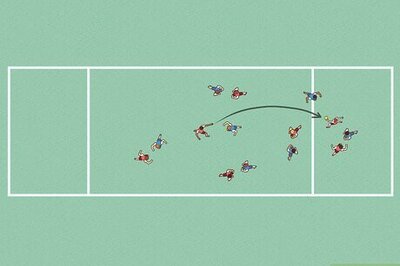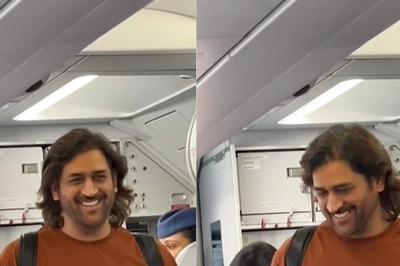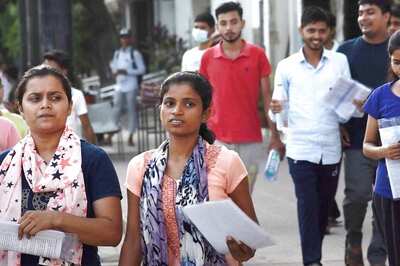
views
New Delhi: Facing one of the most difficult elections ahead, a senior Congress leader has now raised questions over whether it was prudent for the party to have headed the UPA II government after the 2009 polls.
Though he admits that alliances are a compulsion, he feels that the Congress should have sat in the opposition after the last general elections so that it could be in a position to form a government on its own after the coming polls. "It would have been better that in 2009 after getting more support from the people than in 2004, the Congress should have called it quits so that someone else could have formed the government. The Congress could have played the role of a healthy opposition," Congress General Secretary Janardan Dwivedi said.
His views assume significance at a time when the Congress is grappling with the issue of alliances and the government headed by it is facing a 10-year-old anti-incumbency and strong corruption charges.
"You cannot start a new experiment till you end the previous one. Since we did not close that chapter in 2009, we are pursuing the same path right now to face the challenges ahead," Dwivedi, who is considered a strong proponent of 'going it alone', said when asked why the Congress cannot choose to go without alliances in the coming polls.
He prefaced his remarks by saying that in the 2009 polls the Congress had sought the mandate of the people for a party government and not for UPA II, which it did not get though its tally of seats saw a sharp rise.
Dwivedi regretted "perhaps no major political party now has the patience as well as the self-confidence to discharge the role of an Opposition readily, face challenges, struggle for people's cause and then come back with a new shine and mandate to form a government".
He lamented that instead of developing "natural leadership", emphasis was being laid on promoting "technical leadership".
Citing the rise of regional party leaders in the past two-three decades, he insisted "they were not educated abroad or spoke fluent English. They were not even experts of new technology but still they got the support of the people. "Their only limitation was that they lacked a national perspective. But they did have the power to damage the major parties having the national outlook".
Maintaining that both the nation as well as Congress followed a "middle path" and it will remain so, Dwivedi said, "how much ever you try to deflect it from that path, it has not succeeded and it will not succeed.
"It is better that both India and Congress function in tandem. The Congress will not remain Congress if it does not tread the middle path. It has represented India for last 128 years because of this virtue which is all inclusive."
The reticent party leader spoke at length giving insight into the thinking of a section of the party that pitches for bringing in the lost 'glory' of the Congress.
Asked whether the Congress should be practicing alliance politics or focus on long term building of party, he remarked, "My personal opinion is the latter. But when you are part of an organisation, then the democratic norm is that we go by the opinion of the majority".
Asked about the party's apparent urge to align with all sorts of parties, Dwivedi said that "no such decision has been taken so far that you can form any such opinion".
He expressed anguish that no political party these days has the "self confidence and the patience" to sit in the opposition and "dream big" and work for fulfilling the dream.
At the outset, he made it clear that though he was speaking as party General Secretary, some of the views he has expressed were the ones he has pitched for in the party.
Talking about the issues of leadership in parties at length, the 68-year-old leader lamented, "Now leadership does not emerge. It is created. One who has the ability to force out others is considered fit to lead. This difficulty is in all parties."
He said that this problem has arisen because in politics, money and connections have now become important than work, dedication and sacrifice. "Earlier people used to get position after some hard work and sacrifice. Now people get so much immediately because of other reasons and no political party is untouched by this malaise," Dwivedi said.
"Politics is a game of possibilities and sometimes it is a game of impossibilities... that means what sort of dream you see and what cost you are prepared to pay for that great dream.
"It is sad that dreams seem to have been lost. I sometimes feel we are losing our dreams. To see such dreams and to realise them in life, one has to take risks. The question is how many people are ready to take those risks," Dwivedi said.
At a time when alliances and formation of UPA III is the buzz word in the Congress, the party leader stressed, "It is my clear opinion that alliances are a compulsion for everyone. It is not an option but a compulsion. If you have to form government, then get into alliances.
"The view of Congress in 1999 that coalitions are a temporary phase in Indian politics was correct. I have always said that alliances are not an option but a compulsion," he said emphasising that the rise of the regional parties was due to the failure of major parties to listen to the hopes and aspirations of the locals.
As the UPA I was the first experiment of the Congress in sharing power at the Centre, Dwivedi said that it gave the lie to the detractors of the party who had always accused it of neither being capable of running coalition at the Centre, nor willing to do it.
Describing anti-incumbency as a historical factor, Dwivedi recalled that such a situation has emerged in Indian politics after a gap of every ten years since independence and cited the formation of non-Congress alliances in the 70s.
Citing the formation of Janata Party government led Chaudhary Charan Singh and Moraji Desai, VP Singh government in 1989 and HD Deve Gowda and I K Gujarl governments in 1997, he recalled that every time Congress was voted back to power after alternative governments were formed.
"There was an atmosphere of instability from 1996 to 1999 but the values of democracy and anti-communalism were never dead," he said.
Dwivedi also added that after ten years in government it is natural that one has to face all kinds of reactions.
He also lauded the functioning of the UPA I government. In 2004, "we had run the government on the basis of a common minimum programme and when we look back, we can say proudly that no alliance government in our country accomplished so important and comprehensive tasks, which our UPA I government did."
Dwivedi said by running the UPA I government successfully, the party proved wrong the criticism that it cannot run a coalition government.
"An allegation was levelled on the Congress that it cannot run a coalition government or does not want to run it. It was also alleged that the Congress wanted its rule alone. We had proved it wrong in UPA I."

















Comments
0 comment